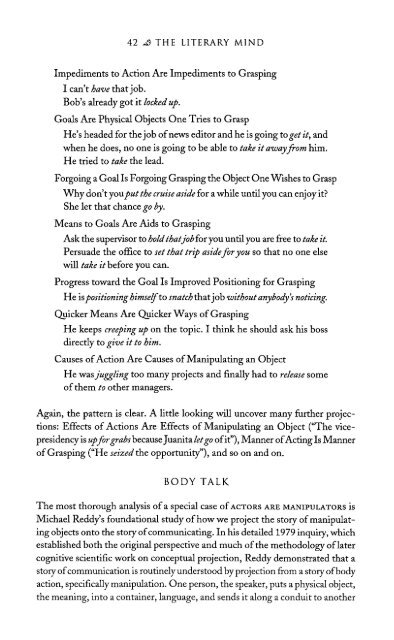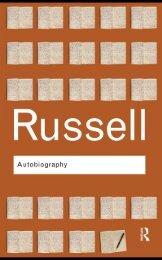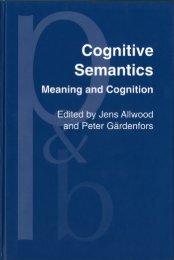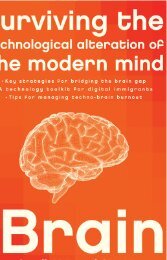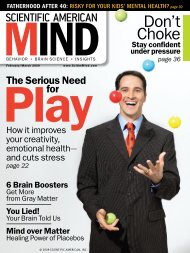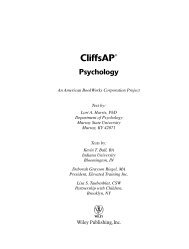The Literary Mind.pdf
The Literary Mind.pdf
The Literary Mind.pdf
Create successful ePaper yourself
Turn your PDF publications into a flip-book with our unique Google optimized e-Paper software.
42 THE LITERARY MIND<br />
Impediments to Action Are Impediments to Grasping<br />
I can't have that job.<br />
Bob's already got it locked up.<br />
Goals Are Physical Objects One Tries to Grasp<br />
He's headed for the job of news editor and he is going to get it, and<br />
when he does, no one is going to be able to take it away from him.<br />
He tried to take the lead.<br />
Forgoing a Goal Is Forgoing Grasping the Object One Wishes to Grasp<br />
Why don't you put the cruise aside for a while until you can enjoy it?<br />
She let that chance go by.<br />
Means to Goals Are Aids to Grasping<br />
Ask the supervisor to hold that job for you until you are free to take it.<br />
Persuade the office to set that trip aside for you so that no one else<br />
will take it before you can.<br />
Progress toward the Goal Is Improved Positioning for Grasping<br />
He is positioning himself 'to snatch that job without anybody's noticing.<br />
Quicker Means Are Quicker Ways of Grasping<br />
He keeps creeping up on the topic. I think he should ask his boss<br />
directly to give it to him.<br />
Causes of Action Are Causes of Manipulating an Object<br />
He was juggling too many projects and finally had to release some<br />
of them to other managers.<br />
Again, the pattern is clear. A little looking will uncover many further projections:<br />
Effects of Actions Are Effects of Manipulating an Object ("<strong>The</strong> vicepresidency<br />
is up for grabs because Juanita let go of it"), Manner of Acting Is Manner<br />
of Grasping ("He seized the opportunity"), and so on and on.<br />
BODY TALK<br />
<strong>The</strong> most thorough analysis of a special case of ACTORS ARE MANIPULATORS is<br />
Michael Reddy's foundational study of how we project the story of manipulating<br />
objects onto the story of communicating. In his detailed 1979 inquiry, which<br />
established both the original perspective and much of the methodology of later<br />
cognitive scientific work on conceptual projection, Reddy demonstrated that a<br />
story of communication is routinely understood by projection from a story of body<br />
action, specifically manipulation. One person, the speaker, puts a physical object,<br />
the meaning, into a container, language, and sends it along a conduit to another


